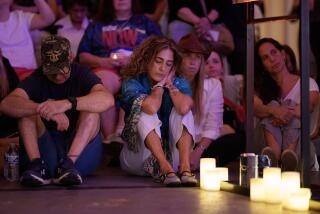Kidnaped American Is Released in Gaza : Relief Official Unhurt, Bears Letter for Bush From Captors
JERUSALEM — An American relief official, whose kidnaping set off a massive manhunt Friday in the rebellious Gaza Strip, walked calmly into a beachfront hostel late in the afternoon with a letter from his captors to President Bush urging understanding of the Palestinian cause.
The release of Chris George, 35, co-director of the private Save the Children Federation of the West Bank and Gaza, ended a tense, 24-hour episode that raised concern about an escalation in the Palestinian uprising against Israeli rule in the occupied territories.
It was the first political kidnaping of a foreigner in the West Bank or Gaza since Israel occupied the Palestinian-populated territories in the 1967 Arab-Israeli war.
Initially, George’s kidnapers had demanded the release of Israeli-held Palestinian activists, including the leader of the fundamentalist Hamas organization, in return for his freedom. But Defense Minister Yitzhak Rabin declared at midday that Washington had put no pressure on Israel to accede to the demands. Later, in Washington, a State Department spokesman said, “We don’t do business that way.”
Message From Kidnapers
According to Palestinian reporters in Gaza, George carried a six-page letter from his captors that he had been asked to deliver to President Bush. The letter asked that the President meet with Yasser Arafat, chairman of the Palestine Liberation Organization, according to reporters who saw it.
George told the Palestinian journalists that he was well-treated by his kidnapers.
“They were nice,” he said, but did not identify them.
State Department officials said the kidnapers identified themselves as members of the Palestinian Popular Army, apparently a cover name. But a well-informed Palestinian source said the abduction was the work of just two men, one of them Mohammed Ahmed abu Nafar, a one-time Israeli prisoner and member of the Popular Front for the Liberation of Palestine, a hard-line group. There have been no arrests in the abduction.
Israel Blames PLO
George was seized outside the Gaza office of his agency at midday Thursday. Announcing the kidnaping Friday morning, the Israel Defense Forces blamed it on “terrorists associated with the Palestine Liberation Organization.”
At PLO headquarters in Tunisia, spokesman Ahmed Abdul-Rahman denied any complicity in the kidnaping by the mainline Palestinian organization.
“The PLO vigorously condemns this operation,” Abdul-Rahman said, adding that it was “damaging to the Palestinian people and the uprising”--the 18-month-old Palestinian rebellion against Israeli rule in the occupied territories. He called on “all Palestinian organizations and individuals to work for (George’s) release so that he can resume his work for Palestinian children immediately.”
The PLO has publicly opposed any action against foreigners in the uprising, but the abduction of the American, whoever the kidnapers, posed the possibility of a new strategy in the rebellion, which is backed by several organizations, including Hamas, that are opposed to the PLO.
The U.S. Embassy in Tel Aviv issued a warning to the estimated 100 Americans living and working in Gaza to stay in their homes and to use extreme caution if going out.
Israeli sources said hundreds of troops had poured into Gaza and the refugee camps of the Gaza Strip in the search for George. A Palestinian reporter said roadblocks had been set up throughout the city, and troops were checking cars and motorists’ identification cards. Israeli authorities declared the territory, home to 650,000 Palestinians, a military zone and barred journalists from the area.
According to relief workers, George had gone to the Gaza office Thursday from his West Bank home for a regular weekly visit. He and Tony Charter, the Gaza director for Save the Children, were inside the office when a Palestinian--two, by some accounts--entered and asked to speak to him. Khatem abu Shaaban, a Palestinian official of the relief agency, told the Associated Press that one man came in and “said he wanted Chris to walk out of the office so that they could discuss an important subject. Chris never came back.”
Press reports said that letters subsequently delivered to the Save the Children office demanded the release of at least seven activists imprisoned by the Israelis, including Sheik Ahmed Yassin, the spiritual leader of Hamas, who is paralyzed and confined to a wheelchair.
Foreign Minister Moshe Arens was quoted by Israel Radio as saying the kidnaping proved that the PLO remains a terrorist organization, a key basis for Prime Minister Yitzhak Shamir’s refusal to enter political negotiations with the PLO on the future of the occupied territories.
But a statement issued by unions of Palestinian physicians, engineers, lawyers and women in Gaza denied the PLO connection.
“The ugly crime is not linked to the Palestinian people,” the statement said. “It is aimed at hurting the Palestinian people, our intifada (the uprising) and our leadership, the PLO.”
James Bausch, president of Save the Children, told a United Press International reporter from his headquarters in Westport, Conn., that George believed the prompt PLO denial of complicity and demand for his release had helped lead to the decision to free him. Bausch said he inferred from talking with George that the kidnapers thought the abduction of an American would focus attention on the Palestinian cause.
After his release, George appeared none the worse for his ordeal, a U.S. Embassy spokesman in Tel Aviv said.
George, of Montclair, N.J., has been working with Palestinian refugees for more than a decade. He served in the Peace Corps in Oman on the Persian Gulf, and then went to Lebanon with Save the Children, working in the Ein el Hilwa refugee camp outside Sidon. He left Lebanon for Israel several years ago after a series of kidnapings of relief workers in the Sidon camps.
More to Read
Sign up for Essential California
The most important California stories and recommendations in your inbox every morning.
You may occasionally receive promotional content from the Los Angeles Times.










